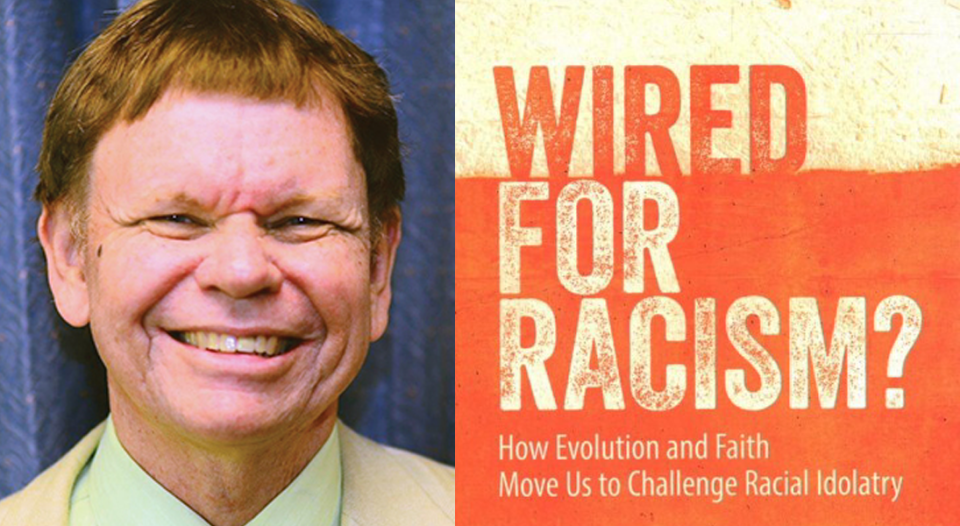When Mark Ellingsen came across both neurobiological research on how racism may be rooted in brain dynamics and evolutionary theory on the importance of cooperation in advancing the human species, he knew there was an interesting book to be written on how such research could apply to American race relations.
But Ellingsen—a professor, author and ELCA pastor of Norwegian descent—felt he would need a co-author of African descent to approach such a topic. He found a partner in his classroom: a former student of his, James Woodall.
For three decades, Ellingsen has served on the faculty of the largest free-standing historic African American graduate theological seminary in the United States, the Interdenominational Theological Center (ITC) in Atlanta. Today, Woodall, a graduate of ITC, is a public policy associate of the Southern Center for Human Rights and an associate minister of Pleasant Grove Baptist Church in Marietta, Ga.
The two continued the meaningful conversations they shared in class by writing together Wired for Racism? How Evolution and Faith Move Us to Challenge Racial Idolatry (New City Press, 2022).
With the input and blessing of Woodall, who was unavailable for an interview due to international travel, Ellingsen spoke with Living Lutheran about their book and the relevance of Lutheran theological heritage in addressing racism in the United States today.
Living Lutheran: Could you tell readers about Wired for Racism?
Ellingsen: Why is there so much racism in America when most of us say we’re not racist? This is a book that tries to answer that question. … In helping us understand this kind of racism, we’re delving into neurobiological research, which indicates that some of our racism is rooted in brain dynamics. But the brain and social structures are plastic—they can change. … And the latest evolutionary theorists’ findings is that what makes human beings superior to every other creature is we’ve got this fantastic ability to cooperate across genetic lines. Does that say something about how the brain can be changed in such a way as to overcome racism?
What’s really neat is there’s also a neurobiological study on what happens to the brain and spirituality: It seems that faith changes the brain and brings out our cooperating sensibilities a little better. So people reading Wired for Racism? can learn about all the brain dynamics associated with faith and this kind of cooperation.
“Faith leads to good works.”
How did you and James Woodall come to co-author the book?
Well, there was this student in one of my classes asking a lot of questions, theologizing in exciting ways. This bright young gentleman—he’s a millennial and I’m a baby boomer—was at the time the youngest president of a state chapter of the NAACP, the state chapter of Georgia. … He and I, we would talk politics, besides theology. Sometimes in these conversations, even when I had him as a student, I stopped being a teacher and I was his student.
So after reading these [neurobiological] insights, I wanted to share it with somebody, a conversation partner. And the two of us just clicked—“Hey, we need a book on this.” And it really is our book, the way we wrote it.
How does the work of antiracism that you examine in the book align with Lutheran theology?
We as Lutherans have this very realistic view of human nature. We say we’re sinners in everything we do. … And that’s the sense in which we are complicit as sinners in these kinds of racial dynamics. Lutherans, then, can agree that the nature of fallen human beings is going to lead to racism. But of course, on the other hand, Lutherans believe in God’s love. And God’s love changes you. Believing in God’s love, the neurobiologists tell us, can get us away from fearfulness of our neighbor who’s not like us. It gets a part of our brain active, the part of our brain that makes us feel fellowship, that we’re in harmony with everything there is. In other words, faith leads to good works.
[But] we deliberately wrote the book so that people of any spiritual orientation, including the non-Christian, could find use in it, precisely because our brains operate similarly in all religious traditions. Religion has a way of cultivating this sense of cooperation, all religions.
How do you hope readers, in the ELCA or otherwise, engage with the book?
I want the Lutheran readers to revel in the fact that we have resources in our tradition that can really help the cause of overcoming and fighting racism. God’s love is all about cooperation. An awful lot of the progressive programs suggested by the civil rights leadership are in line with Martin Luther.
It would be great to see this book get used in Sunday school classes in the ELCA, in study groups in all denominations. … If you’re an all-white congregation, if you’re an all-Black congregation, seek some partners. Have some intercongregational, interdenominational, ecumenical discussions. And just get talking about these ideas.
For Lutheran readers, I’d love it if they came away saying, “Hey, a lot of this stuff about us dealing with civil rights issues is right in line with our Lutheran thinking. Lutheran theology is really relevant.” I’d love to see that happen, but I won’t speak for James on that one.






